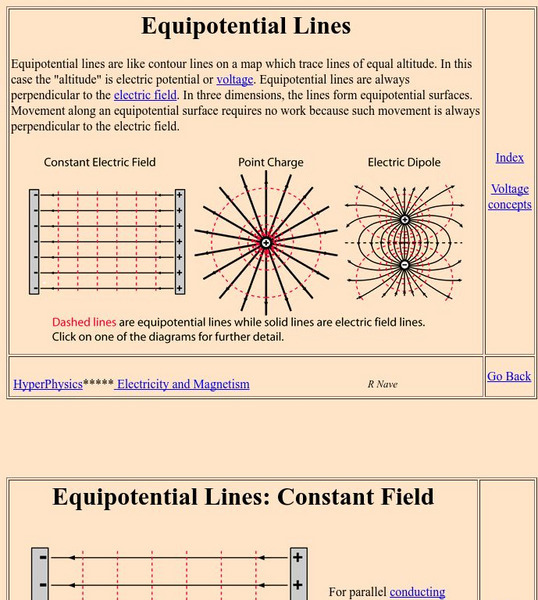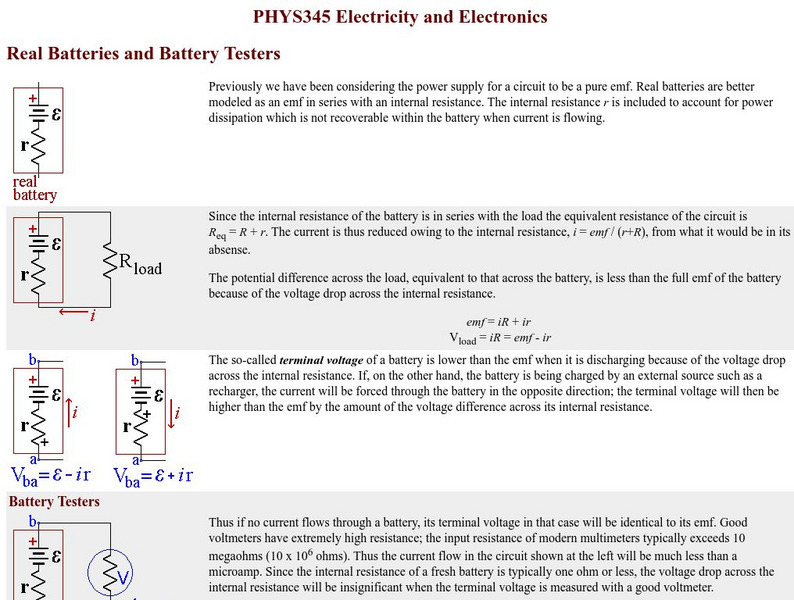CK-12 Foundation
Ck 12: Parallel Circuits
[Free Registration/Login may be required to access all resource tools.] In this lesson, students learn about parallel circuit design, and how to calculate equivalent resistance from resistors in a parallel circuit.
CK-12 Foundation
Ck 12: Voltage
[Free Registration/Login may be required to access all resource tools.] This lesson looks at what voltage is and how to solve problems involving voltage. Includes a simulation for exploring how charges work in an electric field.
CK-12 Foundation
Ck 12: Fourth Grade Science: Physical Science: Electric Current
[Free Registration/Login may be required to access all resource tools.] Defines electric current and relates electric current to different materials (insulators and conductors).
CK-12 Foundation
Ck 12: Physics Simulation: Electric Analogies
[Free Registration/Login Required] Explore a different way of thinking about electricity as a way to become familiar with the concept of potential, current, and resistance using this interactive simulation. A PDF worksheet and a video...
CK-12 Foundation
Ck 12: Physics Simulation: Dollhouse
[Free Registration/Login Required] Learn about the analysis of parallel circuits in the context of a realistic household circuit using our interactive simulation. A PDF worksheet and a video tutorial are also available. [3:24]
CK-12 Foundation
Ck 12: Physics Simulation: Power Lines
[Free Registration/Login Required] Learn about the relationship between electric potential, current, and resistance in the context of high-voltage AC power lines using this interactive simulation. A PDF worksheet and a video tutorial are...
CK-12 Foundation
Ck 12: Physics Simulation: Flashlight
[Free Registration/Login Required] Learn about electric circuits, the flow of current, electrical resistance, and electrical power dissipation by exploring the operation of a flashlight using this interactive simulation. A PDF worksheet...
CK-12 Foundation
Ck 12: Measuring Current and Voltage
[Free Registration/Login may be required to access all resource tools.] Students are introduced to the ammeter, which measures electrical current, and to the voltmeter, which measures voltage.
University of Virginia
Uva Virtual Lab: Resistors and Capacitors and High Voltage
In this simulation a battery will be used to charge a capacitor. The capacitor will then be used to operate a light bulb until the capacitor is discharged.
CK-12 Foundation
Ck 12: Physics Simulation: Marquee Lights
[Free Registration/Login Required] Learn about different ways you can wire an electric circuit, and how the brightness of the lights depends on how they are configured using this interactive simulation. A PDF worksheet and a video...
Khan Academy
Khan Academy: Electrical Engineering: Introduction
Some basic concepts to introduce the electrical engineering course. Become familiar with engineering numbers and notation, and learn about the two most important electrical quantities: current and voltage.
Khan Academy
Khan Academy: Electrical Engineering: Electrostatics
Electrostatics is the study of forces between charges, as described by Coulomb's Law. We develop the concept of an electric field surrounding charges. We work through examples of the electric field near a line, and near a plane, and...
Khan Academy
Khan Academy: Capacitors Article
This article from Khan Academy provides information about capacitors. This information is intended for the Class 12 Physics Course (India).
CK-12 Foundation
Ck 12: Physics: Electrical Systems Study Guide
A study guide covering electrical systems.
PBS
Pbs Learning Media: Dc Circuit Builder
Play with resistors, light bulbs, wires, switches, a battery, voltmeters, and ammeters in this interactive circuit simulation.
Georgia State University
Georgia State University: Hyper Physics: Point Charge Potential
This site from the Georgia State University explains the concept of electric potential about a point charge or combination of severat point charges. An interactive JavaScript form allows the visitor to investigate the effect of distance...
Georgia State University
Georgia State University: Hyper Physics: Equipotential Lines
At this site from the Georgia State University, the equipotential lines around several different configuration of charges are shown and described. Excellent graphics and clear discussion.
Georgia State University
Georgia State University: Hyper Physics: Resistor Combinations
At this site from Georgia State University parallel and series connections of resistors are explained and illustrated. Equations for computing the overal voltage, current, and resistance of such circuits are given and explained.
Florida State University
Florida State University: Lenz's Law
Lenz's Law is defined and demonstrated with an interactive Java applet that shows the relationship between field lines of a magnetic and a conductor ring.
Science and Mathematics Initiative for Learning Enhancement (SMILE)
Smile: Electrochemistry
A teacher lesson plan which could be easily converted into an idea for a student project or presentation. This page describes activities in which the interconversion of chemical and electrical energy are investigated. Complete activity...
Science and Mathematics Initiative for Learning Enhancement (SMILE)
Smile: Ohm's Law
For the teacher planning a lesson plan or for the student preparing for a project or presentation. This page describes a series of simple activities related to the voltage-current-resistance relationship.
Science and Mathematics Initiative for Learning Enhancement (SMILE)
Smile: Resistances in Series and Parallel Circuits
A teacher lesson plan is provided here. This page describes two activities in which the effect of multiple resistors on the current and overall resistance of both series and parallel circuits are investigated. Complete activity...
Other
Univ.of Delaware: Real Batteries and Battery Testers
A discussion of various principles related to voltage. The operation of battery testers and voltmeters are explained. The importance of the internal resistance of a power source is discussed.
Other
Eds Journal: The Control of Risks From Static Electricity
From the ESD Journal website. This page describes the industrial and medical risks associated with the buildup of static charge. The investigation of the electric potential created by such accumulated charges and the materials...

















